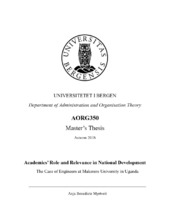| dc.description.abstract | This thesis is a case study of engineers at Makerere University in Uganda. In a broad sense the thesis explores the relationship between scientific knowledge and development in a low-income, Sub-Saharan country, which is yet to be industrialised. There is a prevailing optimism towards the hard sciences, such as engineering, and its potential contributions to development and industrialization. Yet, we know from previous literature that there are many challenges for the sub-Saharan universities, related to funding, lack of facilities, brain drain but also related to their respective government. The aim of the study is to get a deeper understanding of the role of academics and scientific knowledge in the national development agenda. The research question for the thesis is ‘how do the engineers at Makerere University perceive the relevance of their knowledge to national development and industrialisation of Uganda?’. To answer this research question, data was collected through semi-structured interviews with 20 academics affiliated to the School of Engineering, at Makerere University. My findings show that there is a large variation among the engineering academics at Makerere University and how they understand and fulfil their role at the university. Where previous studies have tended to treat academics as a unanimous group, this study shows how a group of academics within the same college vary in motivations, aspirations and how this affects the work they do at the University and thus the relevance of their knowledge to national development. However, there are several challenges for the academics to contribute on the same level as their colleagues in other countries. The strong dependency on international donors of funding for research does not only limit the academics’ ability to do research, but it also has consequences for the academics’ ability to decide areas of research and thus define their own research questions. This makes it difficult for the academics to address issues of national concern, thus the national development agenda. | en_US |
